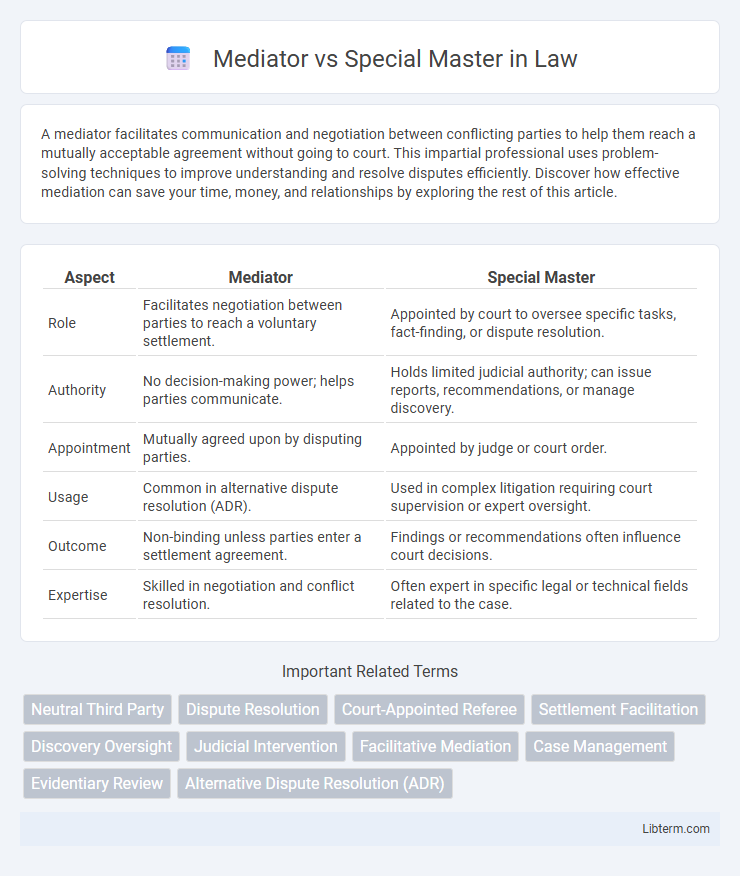A mediator facilitates communication and negotiation between conflicting parties to help them reach a mutually acceptable agreement without going to court. This impartial professional uses problem-solving techniques to improve understanding and resolve disputes efficiently. Discover how effective mediation can save your time, money, and relationships by exploring the rest of this article.
Table of Comparison
| Aspect | Mediator | Special Master |
|---|---|---|
| Role | Facilitates negotiation between parties to reach a voluntary settlement. | Appointed by court to oversee specific tasks, fact-finding, or dispute resolution. |
| Authority | No decision-making power; helps parties communicate. | Holds limited judicial authority; can issue reports, recommendations, or manage discovery. |
| Appointment | Mutually agreed upon by disputing parties. | Appointed by judge or court order. |
| Usage | Common in alternative dispute resolution (ADR). | Used in complex litigation requiring court supervision or expert oversight. |
| Outcome | Non-binding unless parties enter a settlement agreement. | Findings or recommendations often influence court decisions. |
| Expertise | Skilled in negotiation and conflict resolution. | Often expert in specific legal or technical fields related to the case. |
Understanding the Roles: Mediator vs Special Master
A mediator facilitates negotiation between disputing parties to help them reach a voluntary settlement without imposing decisions, focusing on communication and conflict resolution. A special master, appointed by the court, oversees specific aspects of complex litigation, such as managing discovery or ensuring compliance with court orders, serving as an extension of judicial authority. Understanding the distinct functions highlights that mediators promote agreement through collaboration, while special masters provide judicial assistance to streamline legal processes.
Key Differences Between Mediator and Special Master
Mediators facilitate negotiation and help parties reach a voluntary settlement without imposing decisions, emphasizing collaboration and confidentiality. Special Masters are court-appointed officials who oversee specific aspects of litigation, make binding recommendations, and ensure compliance with court orders. Unlike mediators, Special Masters have judicial authority and play an active role in managing complex or technical disputes.
Appointment Process for Mediators and Special Masters
The appointment process for mediators typically involves selection by the disputing parties or a court, emphasizing neutrality and expertise in the subject matter. Special masters, on the other hand, are appointed exclusively by a judge to oversee complex procedural or substantive issues within a case. Courts rely on the Federal Rules of Civil Procedure or state-specific guidelines to guide the appointment, ensuring the appointee's impartiality and specialized knowledge align with case requirements.
Legal Authority: Mediators Compared to Special Masters
Mediators facilitate negotiation and help parties reach voluntary agreements without imposing decisions, holding no binding legal authority over the parties. Special Masters, appointed by a court, possess delegated judicial authority to make binding rulings, oversee compliance, and manage complex litigation elements. The fundamental legal distinction lies in mediators acting as neutral facilitators, whereas Special Masters function as extensions of the court's judicial power.
Scope of Duties: What Each Professional Handles
Mediators focus on facilitating negotiation and communication between parties to help them reach a voluntary settlement, primarily handling conflict resolution in disputes such as family law, commercial agreements, and civil cases. Special Masters take on more judicial functions, including gathering evidence, managing discovery, overseeing compliance with court orders, and making recommendations or decisions on complex or technical issues in ongoing litigation. The scope of a Special Master's duties is broader and more authoritative compared to a Mediator's, often involving detailed case management and legal analysis under a judge's supervision.
Advantages of Using a Mediator
Using a mediator offers the advantage of fostering collaborative communication, allowing parties to reach mutually beneficial agreements without prolonged litigation. Mediators facilitate confidentiality and confidentiality encourages open dialogue, increasing the likelihood of creative, tailored solutions. The cost-effectiveness and faster resolution time of mediation make it a practical choice compared to the more formal, often time-consuming role of a special master who oversees complex judicial matters.
Benefits of Appointing a Special Master
Appointing a Special Master provides focused expertise and impartial oversight, ensuring efficient management of complex legal disputes and discovery processes. Special Masters help reduce court congestion by handling detailed fact-finding and procedural issues, saving time and judicial resources. Their ability to provide tailored recommendations facilitates more informed decisions and can expedite resolution in multifaceted cases.
Common Scenarios for Mediator and Special Master Use
Mediators are commonly used in dispute resolution scenarios such as contract disagreements, family law matters, and workplace conflicts where parties seek a mutually agreeable solution without litigation. Special Masters are frequently appointed in complex civil litigation cases, including intellectual property disputes, class actions, and compliance monitoring, where detailed fact-finding or ongoing oversight by a neutral expert is necessary. Both roles aim to streamline judicial processes but are chosen based on the nature and complexity of the dispute and the desired level of court involvement.
Qualifications and Training Requirements
Mediators typically undergo specialized training programs ranging from 20 to 40 hours, often certified by recognized mediation organizations, emphasizing conflict resolution, negotiation, and communication skills. Special Masters generally require legal qualifications, such as a law degree and substantial litigation experience, combined with expertise in specific subject matters and may be appointed by courts for complex case management. Both roles demand strong interpersonal abilities, but Special Masters often possess deeper legal knowledge and procedural understanding due to their judicial function.
Choosing the Right Professional for Your Case
Selecting between a mediator and a special master depends on the complexity and nature of your case, with mediators excelling in facilitating negotiation and resolving disputes amicably, while special masters offer expert oversight and enforce court directives in intricate legal matters. Consider a mediator for cases requiring confidentiality and collaborative solutions, whereas a special master is preferable when judicial supervision and detailed case management are necessary. Evaluating case specifics, desired outcomes, and legal requirements ensures optimal alignment with the professional's expertise.
Mediator Infographic

 libterm.com
libterm.com